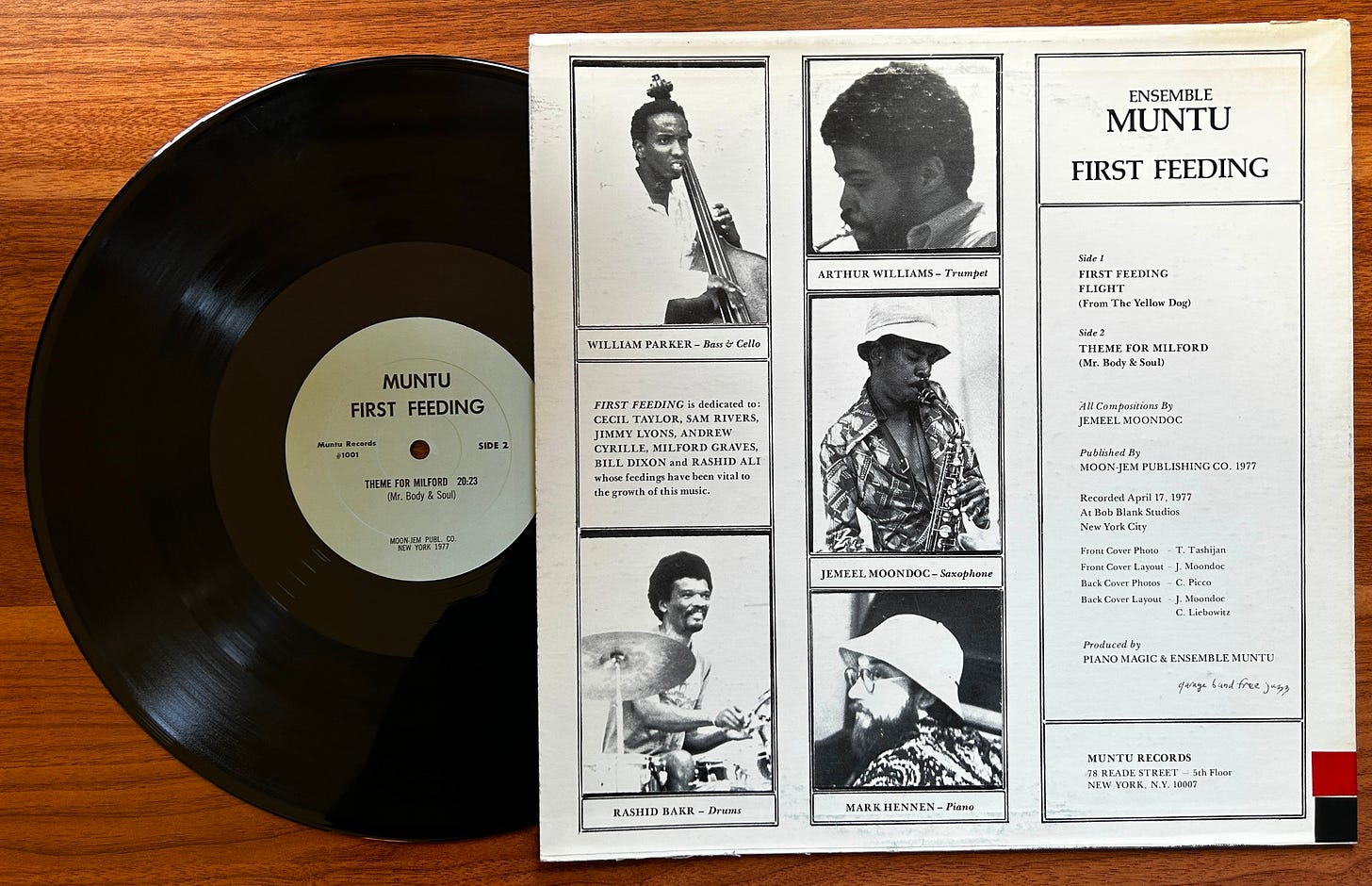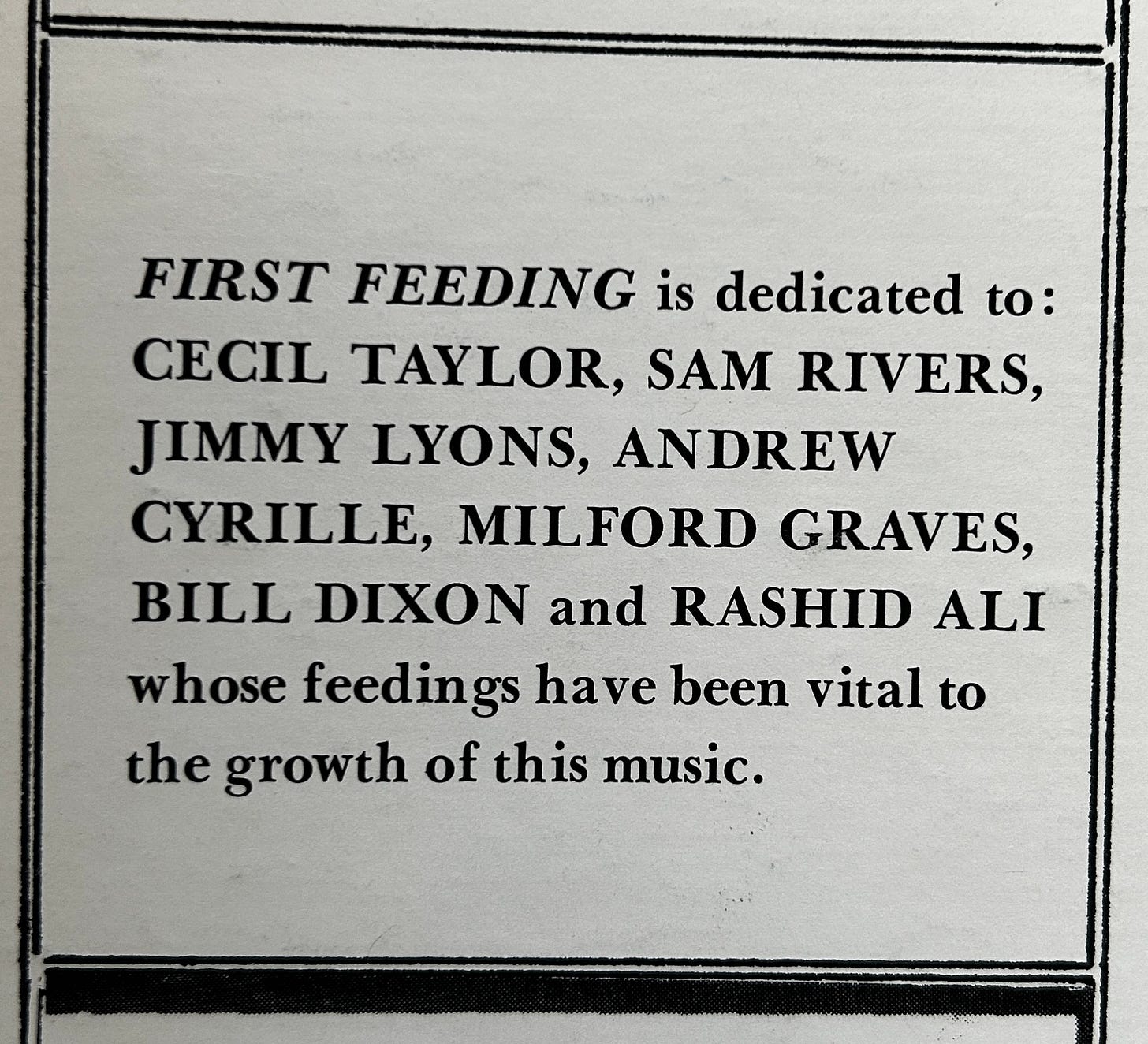Digging Into Free Jazz: Ensemble Muntu’s First Feeding
A rare, self-released 1977 album that added fresh perspective to my jazz collection
Over the past year, my listening has been rooted in bebop and the labels that captured its sound. I've become especially drawn to recordings from the mid-’40s through the mid-’50s with their creatively explosive and/or stunningly beautiful sessions. But that material can feel familiar after a while. That’s when I start scanning for something to break the pattern. Free jazz tends to be where I go, but here’s the thing: while bop and swing catalogs are packed with reliably great material, free jazz is harder for me. I usually have to stream and sample a ton before finding one that truly clicks and is something I want on vinyl as a lasting part of my collection.
This mindset set the stage for a visit to The Archive in Bridgeport, CT, where I found a CD: O’Neal’s Porch by bassist William Parker. I didn’t know much about this release, so I pulled it up on YouTube, scanned some reviews, pulled up the Wikipedia and Discogs pages, and threw in my earbuds to sample it. I was immediately drawn into the alto sax and drums, Rob Brown’s fiery lines paired with Hamid Drake’s absolutely killer drumming, and the trumpet work from Lewis Barnes was nice too. I wasn’t too familiar with any of these players, which made the discovery even more exciting. I could tell this was going to send me down a rabbit hole of exploring more records by each of them. This was the kind of free jazz I like: a diamond in the rough for me. I bought the disc and left the shop genuinely excited about new artists to dig into!
Back home, I did what viewers of the Jazz Bums expect — opened Discogs and started digging! In this case, into William Parker’s discography. That’s when I came across a record called First Feeding by Jemeel Moondoc’s Ensemble Muntu, featuring William Parker on bass. I sampled it and it stopped me cold. This was the kind of free jazz that hit me right away: fiery, expressive, and just plain bad ass.
The music on First Feeding crackles with urgency. Jemeel Moondoc’s alto is sharp and searching, Arthur Williams' trumpet blares and bends in all directions, and Mark Hennen’s piano erupts in flurries. It's William Parker and Rashied Bakr who ground the chaos. Their foundation hold things together and steers the energy of the music that gives the rest of the band space to explore. Even at its most explosive, there’s a surprising clarity to how the group moves as one.
Finding the Record
Original pressings of First Feeding are scarce. This was a DIY release from 1977, privately issued on Jemeel Moondoc’s own label. At the time I discovered the record, a radio station copy from KOPN in Missouri was listed on Discogs. It was listed at $200.
I offered $150. After a long week of back and forth, the seller came back at $160 with free shipping. This was a lot for me, there’s always a bit of a calculus I do when making these decisions: the condition, the price, the rarity, and most importantly, my gut feeling about the music. I usually reserve this kind of spending for records I truly love and feel I may not come across again. In this case, it felt like it met that standard, so I pulled the trigger. The vinyl itself is in VG+ condition. The jacket has some writing on it from its time in a radio station library, including a sticker reading "a music dept purchase."
Collector’s Corner
If you’re not looking to shell out for an original, you’re in luck. In 2009, NoBusiness Records released a 3-CD box set titled Muntu Recordings that includes First Feeding along with The Evening of the Blue Men and an unreleased 1975 live set from Ali’s Alley. The set comes with a 115-page booklet packed with essays by Ed Hazell and Jemeel Moondoc. While the box set is now sold out on Bandcamp, you can still find copies on Discogs.
Ensemble Muntu and the Loft Era
Muntu came out of a very specific moment. Jemeel Moondoc studied with Cecil Taylor at Antioch College, where Taylor emphasized music as a form of cultural and spiritual expression, deeply connected to history and the Black experience. At Taylor’s suggestion, Moondoc read Janheinz Jahn’s book Muntu: African Culture and the Western World. The book’s exploration of the Bantu concept of "muntu", a term signifying human essence or life force, profoundly influenced him. Moondoc adopted "Muntu" not just as a band name, but as a guiding philosophy: music as a bridge between the personal, the ancestral, and the collective.
After moving to New York in 1973, Moondoc and pianist Mark Hennen reconnected with trumpeter Arthur Williams and recruited bassist William Parker and drummer Rashied Bakr. The group spent months rehearsing before securing a breakthrough opportunity at Studio Rivbea, the influential loft space run by Sam Rivers. Moondoc later recalled that they had no gigs for six months and simply rehearsed nonstop, until Rivers offered them a Thursday night slot. That residency turned into a proving ground for the band. Over several weeks, they grew their audience from a handful of curious listeners to packed rooms, establishing themselves as a vital presence in New York’s underground loft jazz scene.
Muntu wasn’t just a band, it was a self-sustaining organism. Born out of necessity during a time when avant-garde jazz had little commercial support, they embodied the ethos of the loft scene: artist-run, independent, and uncompromising. Their DIY approach meant rehearsing intensely, booking their own gigs, and self-releasing their music on Moondoc’s own Muntu Records. These weren’t vanity projects; they were acts of survival and self-determination. The group’s commitment to musical and philosophical integrity created an environment where their art could thrive without interference.
Final Thoughts
One of the most exhilarating things about exploring music is the pure thrill of discovery. For me, that exploration often happens through record collecting (and sometimes CDs, like the William Parker disc that set this whole journey in motion). But it’s not just about stacking up titles, it’s about those moments when the music finds you, shakes you up, and reminds you why this whole adventure matters.
Free jazz, in particular, can be a challenge. I don’t connect with all of it, and finding the pieces that truly resonate takes patience, a lot of sampling, and a little luck. But when I do find them, like O’Neal’s Porch and First Feeding, it’s exhilarating. They’re the kind of albums that make me rethink everything, opening new doors and shifting my perspective in ways I didn’t know I was ready for.
Resources
Ed Hazell, "Jemeel Moondoc: The Muntu Recordings" – Liner notes to the Muntu Recordings 3-CD box set (NoBusiness Records, 2009). Includes extensive biographical context, band history, and commentary from Moondoc and collaborators.
Phil Freeman, "Interview with Jemeel Moondoc," Burning Ambulance, June 2016.
https://burningambulance.com/2016/06/27/jemeel-moondocCisco Bradley, Universal Tonality: The Life and Music of William Parker (Duke University Press, 2021). Particularly useful for understanding Parker’s role in Muntu and the NYC loft scene.
Cisco Bradley, "The Jazz Loft Era and the Rise of Independent Black Improvisation," in Jazz Right Now, 2018.
https://www.jazzrightnow.com/the-jazz-loft-era-and-the-rise-of-independent-black-improvisationPierre Crépon, "The Free Jazz Loft Scene in the 1970s," in Point of Departure, Issue 71, 2020.
Clifford Allen, "Review: Muntu Recordings (NoBusiness NB 501–503),” in All About Jazz, 2010.
https://www.allaboutjazz.com/muntu-recordings-by-jemeel-moondoc-nobusiness-records-reviewFree Jazz Blog, "Jemeel Moondoc / Ensemble Muntu – Muntu Recordings," September 2010.
https://www.freejazzblog.org/2010/09/jemeel-moondoc-ensemble-muntu-muntu.htmlDavid Grundy, "Jemeel Moondoc and the Freedom Tradition," tribute essay, 2021.
https://streams-of-expression.blogspot.com/2021/08/jemeel-moondoc-and-freedom-tradition.htmlYouTube: Vision Festival 2002 – Jemeel Moondoc & Ensemble Muntu Reunion (live performance with Roy Campbell, William Parker, and Rashid Bakr).







